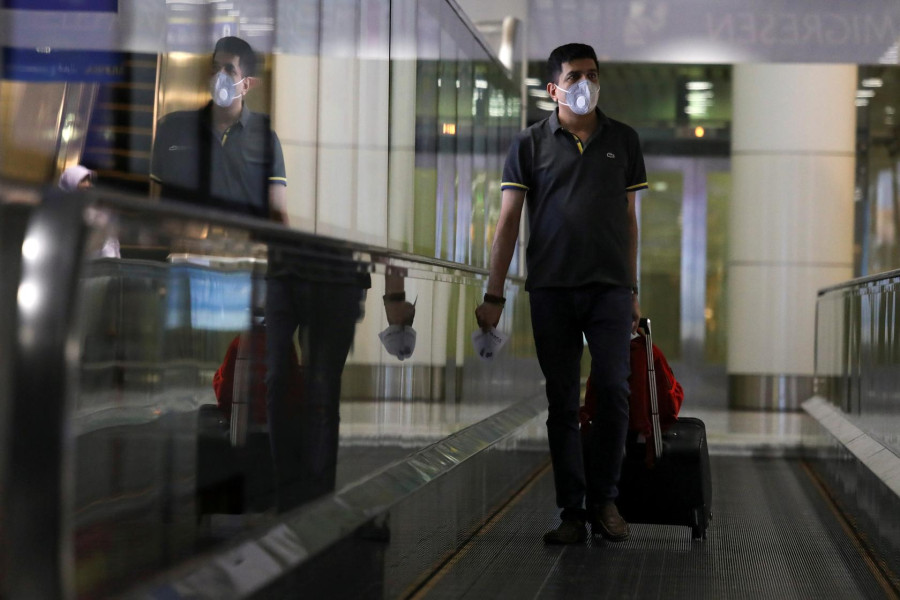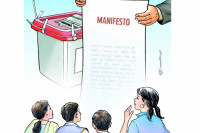National
As Malaysia enforces complete lockdown, Nepali workers struggle with reduced working hours
Nearly 500,000 Nepalis have been living in Malaysia, which remains the most affected country in South East Asia from the Covid-19 outbreak.
Chandan Kumar Mandal
But what was coming as an obstacle to his arrival plan was unforeseen. The ongoing global health pandemic of Covid-19 has also affected his saving plans and the country—Malaysia—he is living and working in for over two years now.
“Since the coronavirus outbreak began, working hours at my factory has come down,” Pandey told the Post from the Malacca City of Malaysia. “Now, we get to work only eight hours so our income is limited to the minimum monthly wage. There is no overtime these days.”
Malaysia is the hardest-hit country in South East Asia due to the coronavirus outbreak. There are as many as 790 confirmed cases of coronavirus with two reported deaths as of Wednesday. On Wednesday alone, 117 new cases of Covid-19 were reported in the country.
Taking a strict measure to control the rapid spread of Covid-19, the Malaysian government, on Monday, announced a complete lockdown of the country.
Starting from Wednesday, all the religious institutions, schools, businesses and government offices, have been shut down until March 31. Likewise, Malaysians are not allowed to travel abroad and the arrival of the foreigners to the South East Asian country has been suspended during the period. Except for essential services like gas stations, supermarkets, banks, and pharmacies, everything else has been closed for the next 14 days.
The recent upheavals in the wake of Covid-19 fear have come hard on Nepali migrant workers living in labour destination countries, including Malaysia, which has been the most affected country due to the pandemic. There are an estimated 500,000 Nepali migrants in Malaysia, the most popular labour destination for Nepali workers.
As the cases of Covid-19 have continued to multiply, Nepali workers are also staying at their apartments, following the government order.
Roshan Kumar Paswan, another Nepali migrant worker, says his workplace is closed for two weeks and he has to stay indoors.
“There is no work for the next two weeks. Although there are no virus infection cases reported in our area, everything is shut down everywhere,” said Paswan, originally from Jaleshwor. “When the work had continued, everyone was wearing masks en route to the office and they were checked before entering the working area.”
Paswan’s company, a confectionery and beverage manufacturer, has assured workers safety. The employer has collected every workers’ contact details and workers have been advised to contact the company staffs immediately in case of any health issues, according to Paswan.
“Everyone is afraid these days. Even if we go back to Nepal, we do not have enough money as income had gone down in recent times,” said Paswan. “If we go back, there is another concern of keeping our family members at risk of spread too.”
But what worries workers like Paswan and Pandey is slashed working hours at the job which will have an effect on their future plans. According to Paswan, his monthly income is now merely Malaysian Ringgit (RM) 1,200 (Approx Rs32,601) of which RM400 is spent on food only.
“We were earning as high as RM1,800 every month when we got overtime work. Now, there is no overtime,” said Paswan. “Now it’s hard to survive with that income.”
For years, Malaysia has been a topmost labour destination country for Nepali migrant workers. Nepali workers have preferred to work in Malaysia, which has a favourable weather condition for Nepali workers in comparison to the Gulf countries.
However, the Nepal government had barred Nepali workers from going to Malaysia, following a crackdown on agencies charging hefty money on Nepali workers for pre-departure services. As a result, only 42,146 Nepali workers could reach Malaysia in the last fiscal year before departures resumed in September last year.
At the time, when departures for labour destinations, including Malaysia were expected to see a surge, the ongoing pandemic has invited fresh troubles for the country’s foreign employment sector. While the government has already stopped work permit, even those living in those countries are going through a hard time.
“I have three years of work contract so I will have to stay until January. I might consider extending it too if everything gets normal,” said Pandey. “I think the whole year will be disturbed. There will not be much work as there is no guarantee when normalcy will be restored. Now I will not have a good sum in my hand when I will be returning home.”




 10.12°C Kathmandu
10.12°C Kathmandu















